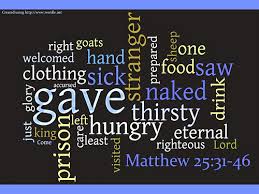Matthew 1:18-25; Luke 1: 26-38
This week, as I prayed and thought
about the Gospel reading about Joseph, I started imagining a conversation
between Mary and Joseph when he learned that she was pregnant. The two Gospels
of Matthew and Luke tell the story of Jesus’ birth differently. Matthew focuses
on Joseph, and Luke focuses on Mary. Yet, there are plenty of similarities. Both
are visited by an angel. Both are told the child is sent by God to save the
world. Both say, “Yes,” to God’s call.
So, let’s put Mary and Joseph
together to see what they might say to each other. I have to admit this is a
lot of “what-if.” Jews might call it “Midrash,” a story that expands on
Scripture to help us understand it. …
Joseph: Mary, can we talk? Maybe on
that bench over there, where people can see us, but not hear us.
Mary: Of course. What’s on your mind,
Joseph?
Joseph: Mary, we have been promised
to each other since we were children. A few months ago, we became officially engaged.
We will marry in a few more months. But now, I have heard rumors that you are
with child.
Mary: It’s true. I am with child. I
haven’t told anyone here except my parents because the story is so hard to
believe. … You know how every girl these days wants to be the mother of the
Messiah? Three months ago, an angel appeared to me and told me I am the girl! …
Joseph: What!?
Mary: I couldn’t believe it either.
But the angel told me my cousin Elizabeth is also pregnant – and she was
already too old to have babies. So, I went to see her. It’s true, she is
pregnant. She said an angel had appeared to her husband Zechariah and told him
it would happen. Their child is supposed to be the prophet who goes before our
child to prepare the people for his coming. … It’s so amazing, I can hardly
believe it myself. But, I know now that I am pregnant. I have been true to you.
I have never been with another man. I promise! It has to be God’s doing!
Joseph: When I heard you were
pregnant, I was so angry. I wanted to shout from the rooftops how you had
shamed me. I wanted to have you stoned! … But then, I calmed down and made up
my mind to just quietly end the engagement. I planned to talk with the Rabbi
today.
Mary: Oh, Joseph. …
Joseph: But then, I had a visitation
from an angel, too. Last night, he told me your baby is from God, from God’s Holy
Spirit. So, now I understand that we should go ahead and get married. Probably,
we should get married soon, so people don’t talk so much about this baby. We want to make sure there is no shame in his life.
Mary: Great idea. I’m ready. Now let’s
talk about baby names. The angel said I should call the baby Joshua, which
means “God saves.”
Joseph: The angel told me to name
him Joshua, too. He also said people would call him “Emmanuel” – so he will
save by being with us.
Mary: And, Son of the Most High. He
will be the Son of God!
Joseph: Mary, what have we gotten
ourselves into? Just what is it that God is asking us to do?
Mary: I guess we are to be the human
parents of God’s son. How will we ever do that?
Joseph: I think we should not tell
people about this. We can tell people we got excited about getting married and
got pregnant. Since we are already engaged, people will soon forget the timing
and fall in love with our baby.
Mary: And we should pray, a lot, for
God to guide us. Now, let’s go talk to our parents about a wedding.
… As Jesus grew up, I’m sure Mary
and Joseph had many such conversations. How do these human parents raise God’s son?
I have long imagined Mary crafting and singing the song we call the Magnificat:
My soul rejoices in God my Savior, who will change the world by lifting up the
lowly and casting down the high and mighty. Because Jesus’ ministry so closely
follows the words of Isaiah and the Magnificat, I believe Mary taught him that
God wants love and justice for all people by teaching him this song.
 Why, do you think, God chose this way
to save the world? There are lots of theories and theologies. Personally, I
think it all has to do with love.
Why, do you think, God chose this way
to save the world? There are lots of theories and theologies. Personally, I
think it all has to do with love.
When we look at a baby, all we want
to do is hold and cuddle the infant. This is why we love Christmas so much.
When we see Baby Jesus, we feel love. We feel love even if the baby belongs to
a total stranger we see in the store or doctor’s office. The love we feel at
that moment is the love God feels for each of us. Pure love, wonderful love.
 While he walked the earth, Jesus
loved. He did not judge. He tried to win over even his enemies – the Priests and
the Pharisees and the Romans. He showed them love first. His parables are about
loving one another and the justice that comes from true love. On the cross, his
words were about love and forgiveness.
While he walked the earth, Jesus
loved. He did not judge. He tried to win over even his enemies – the Priests and
the Pharisees and the Romans. He showed them love first. His parables are about
loving one another and the justice that comes from true love. On the cross, his
words were about love and forgiveness.
I believe that Jesus came as a baby,
grew to be a man on a mission, and died without blaming those who killed him, so
we could know for sure God’s true heart is love. He was raised from death so we
could know that God has power over life and death, and that death is not the
final word for us. God wants us to know that God loves us so much, God wants to
spend time with us now and in the next world.
… This week, practice giving and
receiving love. Let yourself love everyone, even if your first instinct is to
judge. Allow the love others offer enter your heart, even if you don’t want
them to love you, or if you don’t feel lovable. This week, let love guide you
to follow Jesus, wherever you go.
Please pray with me. Jesus, so long
ago, you came to us. You have shown us how to love. Remind us daily to love
others, and to let ourselves be loved, by you, and by those we meet. Amen





































